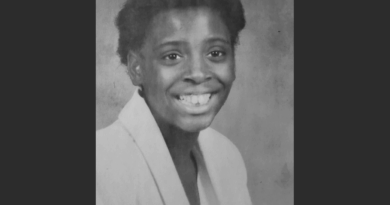Caitlin Walch Tracey Falls to Her Death and Severed Foot at High Rise Building Stairwell in Chicago Illinois
Caitlin Walch Tracey was born on May 29, 1988, in Michigan, where she grew up in a close-knit family. She was known to friends and family as “CT,” a nickname reflecting her warmth and approachable personality. Caitlin attended Mercy High School and later Michigan State University, where she cultivated strong friendships and a reputation for kindness and drive. Her Catholic upbringing and deep ties to her family remained central to her life, even as she pursued education and professional opportunities.
In adulthood, Caitlin relocated between Michigan and Chicago, Illinois. Her marriage to Chicago tax attorney Adam Beckerink connected her life to both communities. To her loved ones, Caitlin was a vibrant, compassionate woman with a strong will, a keen intellect, and an enduring loyalty to family. Those who knew her best described her as someone who balanced ambition with a caring nature, often going out of her way to help others while nurturing her own passions.
Marriage and Domestic Tensions
Behind the surface of Caitlin’s marriage, however, lay deep turmoil. In the months before her death, court records and police reports documented allegations of domestic violence. On August 19, 2024, Michigan authorities responded to a 911 call from Caitlin’s home, where an incident of abuse was captured on police body camera. Adam Beckerink, her husband, was charged with multiple counts of domestic violence.
The case in Michigan became a significant thread in Caitlin’s story. Prosecutors argued that the 911 audio and body camera evidence revealed the volatile environment in which Caitlin lived. Although these charges were separate from her death, they painted a picture of a marriage marked by instability, fear, and escalating conflict.
Discovery of the Body
On October 27, 2024, Caitlin was found dead in the stairwell of a high-rise residential building in Chicago’s South Loop neighborhood, where her husband resided. The grim discovery shocked her family and community. She had suffered catastrophic injuries consistent with a fall from a significant height.
The Cook County Medical Examiner’s office later determined the cause of death as “multiple injuries due to a fall from height.” The details of her injuries were harrowing—fractured ribs, severe trauma to the skull, and the traumatic amputation of a foot. Court filings later suggested that Caitlin fell approximately 20 to 24 floors before her body came to rest in the stairwell. Her body was described in official language as “pulverized,” an indication of the devastating force of the fall.
The Medical Examiner’s Findings
The Cook County Medical Examiner released its ruling in May 2025, months after Caitlin’s death. While the cause of death was clear, the manner of death was not. Officials listed it as “undetermined,” leaving open the possibilities of accident, suicide, or homicide.
This ambiguous conclusion added layers of uncertainty to the case. For her family, friends, and community, the lack of closure was agonizing. Many pointed to the history of domestic abuse and questioned whether Caitlin could have voluntarily placed herself in a position to fall. Others considered the possibility of an accidental fall within the high-rise building. Without definitive findings, speculation has continued to surround her death.
Legal Battles Over Her Remains
Caitlin’s death was followed by a legal dispute over the custody of her remains. Her parents, deeply grieving and determined to honor their daughter’s memory, petitioned for control. For weeks, the matter wound its way through court.
In November 2024, a judge ruled in favor of Caitlin’s parents, granting them custody of her remains. This ruling allowed them to proceed with funeral arrangements, ending a period of painful uncertainty. On November 24, 2024, Caitlin’s funeral was held at Old St. Patrick’s Church in Chicago, where friends, family, and members of the community gathered to honor her life. The service celebrated her legacy while highlighting the profound tragedy of her untimely death.
The Role of Her Husband
Adam Beckerink, Caitlin’s husband, remained a central figure in the case. He was the one living in the South Loop building where her body was discovered. Just months before, he had been arrested in Michigan on charges related to domestic violence. While Chicago authorities questioned him in the immediate aftermath of Caitlin’s death, he was released without charges at the time.
Prosecutors in Michigan pressed forward with the domestic violence case. In June 2025, a judge ruled that 911 audio recordings and police body-camera footage could be played at his trial, which was scheduled to begin later that year. Although this trial was separate from Caitlin’s death, it drew significant attention because of its potential to shed light on the circumstances surrounding their relationship.
Family and Community Reactions
The death of Caitlin Walch Tracey reverberated across both Michigan and Illinois. Friends and family spoke of a woman whose life had been cut tragically short. They remembered her as intelligent, compassionate, and deeply loved. The uncertainty surrounding her death—combined with the shadow of domestic abuse—amplified the grief felt by her community.
Many called for justice, demanding a thorough and transparent investigation. For some, the undetermined manner of death reflected an incomplete search for truth. Others felt that even if charges were never filed in her death, the domestic violence case against her husband would ensure accountability for at least part of what Caitlin endured.
Media Coverage and Public Interest
Caitlin’s story drew widespread media coverage. Major outlets in Chicago and Michigan reported on her death, the domestic violence charges, and the ongoing questions surrounding her case. Coverage often focused on the stark contrast between the vibrant life she had lived and the violent, mysterious way it ended.
The details of her injuries, particularly the fact that her body had fallen from such a height, captured public attention. Comparisons were drawn to other high-profile cases involving unexplained falls. Online communities, including true crime forums, debated theories about her death, with some pointing to potential foul play and others speculating about a tragic accident.
Ongoing Uncertainty
As of mid-2025, Caitlin’s death remains an open question. The Cook County Medical Examiner has not revised its determination, leaving the manner of death as undetermined. The Chicago Police Department has not announced any new developments or charges in the case.
Meanwhile, the trial of Adam Beckerink on domestic violence charges in Michigan has kept Caitlin’s story in the headlines. Prosecutors hope to secure a conviction, which may provide at least some measure of justice for Caitlin’s suffering, even if it does not directly answer the questions surrounding her final moments.
Legacy
The legacy of Caitlin Walch Tracey lives on in the memories of those who loved her. Her family continues to honor her life and to demand accountability and truth. For them, Caitlin was not just a victim but a cherished daughter, sister, and friend whose warmth touched many lives.
Her death has also raised broader awareness about the realities of domestic violence. Advocates have highlighted her case as an example of how abuse can escalate, sometimes with fatal consequences. Through her story, attention has been drawn to the importance of supporting victims and ensuring that systems of justice respond swiftly and effectively.
Conclusion
The death of Caitlin Walch Tracey on October 27, 2024, in Chicago, Illinois, remains one of the most tragic and haunting cases in recent years. A woman of promise, deeply loved and admired, lost her life in circumstances that remain clouded by uncertainty. While the cause of her death is known, the unanswered questions surrounding its manner leave her family and community searching for closure.
As her parents and loved ones carry forward her memory, Caitlin’s story stands as a reminder of the fragility of life, the dangers of domestic violence, and the enduring need for justice and truth.
Discover more from City Towner
Subscribe to get the latest posts sent to your email.




